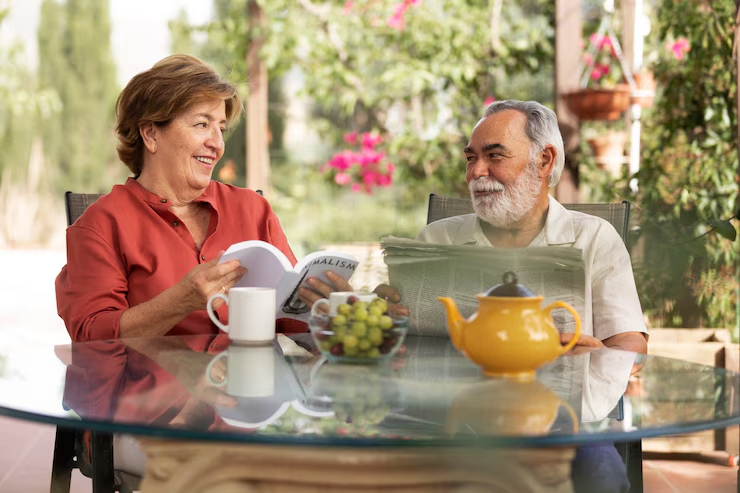
You have endured years of deadlines, alarms, performance reviews, back-to-back meetings, and continual pressure to do more, be more. Retirement is here. But if you’re being honest, you’re still wired instead of lounging in peace. You feel tired yet restless. You can rest at last, but you don’t know how. The real work is unlearning burnout and embracing rest and recovery after retirement.
Burnout Doesn’t Quit When You Clock Out
Burnout isn’t just stress; it is a profound, systemic exhaustion of the body, mind, and spirit. Studies say it’s a work-related experience, but it can last well beyond your last day on the job. You might notice sleep problems, a general sense of urgency, and the feeling of guilt you hold when you’re “not being productive” still exist even after you retire.
This isn’t your fault. After years of running in overdrive, your nervous system is stuck in fight-or-flight mode. The high alert does not end when you drop your office badge. That’s the reason you can’t simply count on “taking it easy” to unwind after a career in which you make hard decisions and deal with conflict all the time. It requires intention, practice, and some days, a full mental reset.
Why ‘Keeping Busy’ Is Not the Right Approach
These days, many retirees, concerned about the prospect of being directionless, pack their calendars with volunteering, side gigs or even new businesses. Movement can be good, but nonstop bustle could lead to burnout. You are doing, not being.
We do worship productivity in our culture, after all. From an early age, we are taught that more is better, faster is better, and staying one step ahead is better. So, of course, with retirement, when you’re no longer defined that way, there’s a sense of loss for people. They might fear being perceived as lazy for taking breaks, or they could link slowing down with becoming obsolete. But here’s the reality: that rest and recovery in retirement is not laziness; it’s wisdom.
What Deep Rest Looks Like in Real Life
Rest is not watching television or sleeping in; at least, deep rest is not. True rest is rejuvenating. It is what the body of each of those dancers needs when, finally, the adrenaline wears off. It’s the opposite of scrolling through your phone or half-watching the news while mentally drawing up a to-do list.
When we fully rest, our brain waves change: the ones we access in meditation, creativity, and healing. Research shows that regular siestas can lower stress hormone levels, reduce inflammation, and even slow aging at a cellular level.
It’s so important for emotional healing following retirement. You’re not just recuperating from work; you’re processing decades of habits, beliefs, and internalized pressure. Deep rest makes room for recalibration.
What does it look like?
- Hiking in nature without headphones.
- Sitting on the porch, watching the light shift.
- Gentle yoga or stretching without a focus on performance.
- Journaling with no agenda.
- Five minutes of mindful breathing in the morning.
These aren’t luxuries. They are necessities. Read our article on 9 Practical Brain Exercises to Stay Mentally Sharp in Retirement.
Retirement Rest Myths
Myth #1: Rest Is for the Weak
Rest is not an indicator of weakness; it’s a sign of intelligence. High achievers, from athletes to managers, are deliberate about recovery in every field. You have pushed and pushed and pushed for decades. Deep rest is the next phase of that excellence, not an escape from it.
Myth #2: I Have to be Doing Something or Another All of the Time
If you’ve measured your worth by productivity for years, letting go of that belief may feel strange. However, disconnecting productivity from purpose can lead to burnout and a lack of fulfilment. Purpose can come from being present, slowing down, and savouring the moment.
Myth #3: I Will Get Bored Slowing Down
Another extreme belief that some people hold about fishing is that they will become bored if they do nothing but fish all day.
Many retirees are afraid of being bored, yet boredom is often a misunderstood form of withdrawal. When your nervous system quiets, you start to find bottomless wells of creativity, curiosity, and joy that were covered up by fatigue that you were too tired to notice before. The abundance of unstructured time is real.
Myth #4: When I Sleep, I’m Not Growing.
One of the most popular myths is that sleeping means you’re not growing. In fact, rest is an invitation to your deepest growth. And without the constant external pressure, you can begin to grow inwardly, emotionally, spiritually, and relationally. This season isn’t the end; it’s your opportunity to grow in a new way.
Myth 5: I’ll never start again if I stop.
“Resting is not the same as quitting.” It means recharging. True rest will bring you back into activity with greater clarity and resilience. You’re not winding down. You’re realigning.
Slowing Down in Retirement
Doing nothing is not the same as slowing down. It’s doing less, better. And there are significant rewards:
1. Mental clarity: A University of Michigan study found that 20 minutes of quiet rest enhances memory recall and mental processing.
2. Emotional regulation: Rest helps to reset the brain’s fear center, making you less reactive and more present.
3. Physical Recovery: Your body can enter “repair mode,” exhibiting improved immune function and reduced inflammation when it is free from chronic stress.
4. More Joy: When you’re not in survival mode, small joys are available for you to savor, such as sunlight filtering through the trees, warm coffee, and music.
The advantages of slowing down in retirement are personal and relational. You become more available to your spouse, grandchildren, and friends. Respond rather than react and listen more effectively. Present, not just as an individual.

Retirement as a Time to Reset
Your usefulness doesn’t come to an end upon retirement; it marks the beginning of your freedom. Retirement, as a form of reset, invites you to ask new questions: What rhythms work for me now? What promotes peace, not pressure? What do I care about when there’s no scoreboard?
This is a spiritual and emotional reset. You can finally hear yourself without the noise of a schedule. And now, perhaps for the first time, you get to determine how your days will look.
Take this season to redefine success, not in the outbox but in health, not by trophies but by tranquility.
How to Unlearn Burnout: A Practical Guide
Unlearning burnout takes time. Here’s how to start:
- Grant Yourself Permission: Repeat this aloud: “I am allowed to relax.” Repeat until you believe it.
- Create Unstructured Time: Not every hour has to have a purpose.
- Try Micro-Rests: Before switching tasks, take a moment to take five deep breaths. Look out the window. Let your brain catch up.
- Establish Tech Boundaries: That buzzing phone keeps your nervous system on edge. Designate “offline” hours.
- Reflect Weekly: Keep a journal or record how you’re feeling. Are you more relaxed? More present?
- Honour Your Body: When you’re tired, take a nap. Stretch without judgment. Your body is your ally now, not your machine.
All of this promotes rest and recovery after retirement. It’s about more than a quick fix; it’s a shift that lasts.
What Happens When You Really Rest
Here’s what perhaps you’ll observe as you practice deep rest:
- Your sleep gets better and not just longer, but deeper.
- You stop rushing. There’s no one at the finish line, so why the rush?
- You feel lighter emotionally. Old regrets or work drama are less crushing.
- You rediscover lost pleasures: drawing, gardening, singing.
- You become more curious. With the energy set free, wonder comes rushing back.
This is rest and recovery after retirement in action. It’s not passive. It’s powerful.
Discover more Resources on Rest and Retirement
For more on living well after work, go to RetireFulfilled Retirement Wellbeing Hub.
For more ideas on rewriting your next chapter, check out RetireFulfilled’s Guide to Purposeful Retirement.
Discover tips for staying healthy as you age and resting well in Age UK’s Health and Wellbeing section.
More helpful mental health advice on life after retirement can be found here.
Get support: Join the RetireFulfilled community
Closing Thoughts: Rest is Revolution
You do not owe anyone any explanation for why you are slowing down. Rest isn’t something you earn. This is something you were made for.
Unlearning burnout is going to have to happen, and it’s not going to happen overnight. With every slow morning, every quiet evening, every deep breath, you take yourself back a little more.
Retirement isn’t only about stepping away. It is about stepping into something richer. Something freer. Something more human.
So take a nap, sit in the sun, say no to the meeting, and say yes to the moment. You’ve done enough. Now, it’s time to be.
Let resting be the most radical act you will perform.


